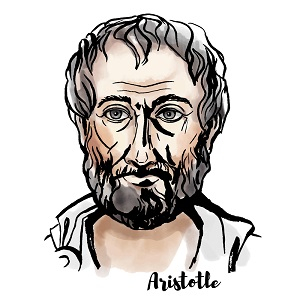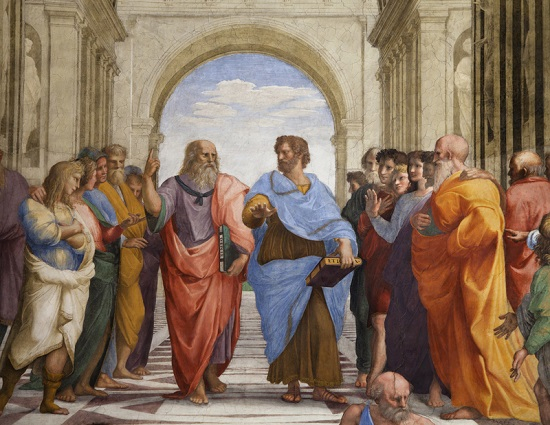

 Aristotle was known as the greatest thinker of all the time. Aristotle’s contributions can be seen in the several parts of science, arts, philosophy, ethics and politics. His ideology worked as a major framework for the basis of the Christian and Islamic philosophies. In the western intellectual revolutions, like, Renaissance, Enlightenment and other reforms his thoughts worked as the milestones/pillars for the whole development.
Aristotle was known as the greatest thinker of all the time. Aristotle’s contributions can be seen in the several parts of science, arts, philosophy, ethics and politics. His ideology worked as a major framework for the basis of the Christian and Islamic philosophies. In the western intellectual revolutions, like, Renaissance, Enlightenment and other reforms his thoughts worked as the milestones/pillars for the whole development.
The birth of Aristotle is speculated by historians and it is believed that he was born in the region of Macedonian (northeastern Greece), in Stagira (present day Thessaloniki) in the year 384 BC. Aristotle’s father, Nicomachus, was a doctor and mother's name was Phaestis. Aristotle learnt medicine from his father, who served Amyntas II (king of Macedonia), therefore Aristotle became friends with Philip (son of Amyntas II). Aristotle’s parents died before he was thirteen, and he grew up under the guidance of his uncle Proxenus of Atarneus. At the age of 17, in Athens he joined Plato’s academy.
Plato's academy was an epicenter of politics, which affected Aristotle’s views about politics.
Aristotle is considered as the introduction of logic, although his use of the axiom for logic was transferred from Plato. The basics of the use of the axioms is found in propositions and syllogisms. In the work of epistemology his views were different from Plato and therefore he always supported the idea that the knowledge of the universe always rises with its study. His logical explanation always supported the analytical approach and interpretation of the formal logic.
Aristotle always manifested that the understanding of the natural phenomenon and nature itself comes under the area of natural philosophy. Therefore his idea of natural philosophy consisted of physics, biology, medicine, etc. He considered that an element Aether is the divine element which is available in all materials and therefore for the existence of any material Aether is the essential part with the other elements like water, fire, earth, and air given by the Empedocles. The other important his inclusions are in the field of biology for categorising the species, then defining the types of motion, discoveries in astronomy and many more.
The areas of practical philosophy which Aristotle worked into was politics, ethics, rhetoric, and economics. He thought that a good man always possesses a noble character and that is an important ornament. His several treatises (importantly Nicomachean Ethics) discussed essential ethics ideas. In his political idea he always supported the empires but their basic character should be not only to provide the law and security to the rights of the people but also providing their citizens a beautiful life and freedom to perform noble acts.
He was a famous personality and almost worked in all areas of the sciences and practical philosophy. One can understand his relevance and importance from the fact that his ideas, theories, and philosophies are still very much relevant in modern times. The influence of Aristotle's works can be seen in his successors (Theophrastus), his followers, later European thinkers, in the early modern scientific developments, in the mediaeval European philosophies, medieval Islamic world, and medieval Judaism.

School of Athens, a painting by the Raphael
Since Aristotle has worked on the wide areas of multiple fields of science and arts, however his work did not survive that long and therefore mostly preserved by his followers and successors. Among his works, the lost work is mostly his essays, poetries and theatre works, which cannot be found nowadays. The survival works of Aristotle is basically preserved in forms of treatises, called Corpus Aristotelicum.
In the honour of Aristotle, there are several portraits, sculptures and monuments built. Many artists included his ideas in their paintings and works and displayed them widely over the world. In Antarctica, a mountain is named after him as Aristotle Mountain. A crater in the moon is also named after him as Aristoteles.
Thus, Aristotle is considered as one of the greatest philosophers and that reflects in his works and the wide range of his influence on the different areas. The areas of his works include the areas of ethics, science, politics, poetry, theatre, etc. Among his works use of logic and its explanation through the axiom was developed after his efforts.
Q1. What makes Aristotle so famous among the philosophers?
Ans. Aristotle has a tower image among the philosophers because of his approach and giving a start to the several scientific fields and also for the classification of the animals and objects.
Q2. What are the important philosophies of Aristotle?
Ans. Aristotle’s areas of work are very wide, and therefore his influence in the spread and development of metaphysics, science, politics, logic, ethics, theatre, poetry and in the other general aspects of human life philosophy.
Q3. What are the well-known works of Aristotle?
Ans. Aristotle’s works are consolidated by his followers or disciples. First group consists of the popular works of Aristotle, the second work consists of the treatise of Aristotle's philosophy, and the third group of his work basically includes lost works of his essays, poetries, theatre etc.